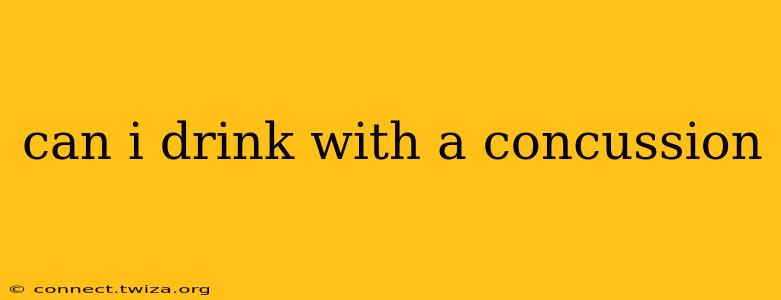Can I Drink Alcohol With a Concussion? The Definitive Answer is NO.
A concussion, even a mild one, is a serious brain injury. Mixing alcohol with a concussion is incredibly dangerous and can significantly worsen the symptoms and recovery process. The short answer is a resounding no. Let's explore why.
How Does Alcohol Affect the Brain After a Concussion?
Alcohol is a depressant, meaning it slows down brain activity. After a concussion, your brain is already vulnerable and working overtime to repair itself. Adding alcohol further depresses brain function, potentially leading to:
- Prolonged Recovery: Alcohol can interfere with the brain's natural healing process, slowing down recovery time and increasing the risk of long-term complications.
- Increased Symptoms: You might experience a worsening of existing symptoms such as headaches, dizziness, nausea, confusion, and memory problems. These symptoms could become significantly more severe.
- Cognitive Impairment: Alcohol can exacerbate cognitive difficulties, such as difficulty concentrating, remembering things, or making decisions, which are common after a concussion.
- Increased Risk of Second Impact Syndrome: In rare but extremely serious cases, consuming alcohol after a concussion could increase the risk of second impact syndrome (SIS). SIS occurs when the brain sustains a second concussion before the first one has healed, leading to potentially fatal brain swelling.
- Increased Risk of Bleeding: In some cases of concussion, there might be internal bleeding in the brain. Alcohol can increase the risk and severity of this bleeding.
What Should I Do Instead of Drinking Alcohol After a Concussion?
Focus on rest, hydration, and proper nutrition to aid your recovery. This includes:
- Plenty of Rest: Get ample sleep to allow your brain to heal.
- Hydration: Drink plenty of water to help your body flush out toxins.
- Healthy Diet: Eat nutritious foods that support brain function.
- Avoid Strenuous Activity: Avoid any activities that could put extra strain on your brain.
- Follow Medical Advice: Follow your doctor's instructions carefully and attend all follow-up appointments.
How Long Should I Avoid Alcohol After a Concussion?
There's no single answer to this question, as recovery time varies depending on the severity of the concussion and individual factors. However, it's generally recommended to avoid alcohol completely until you're fully recovered and cleared by a medical professional. This could take several weeks or even months.
What are the Long-Term Effects of Alcohol Consumption After a Concussion?
Long-term effects can be significant and include persistent headaches, cognitive difficulties (trouble concentrating, remembering things, or making decisions), mood changes, and an increased risk of developing chronic traumatic encephalopathy (CTE) in cases of repeated head injuries.
Can I Drink Coffee or Other Stimulants After a Concussion?
While alcohol is strictly forbidden, the effect of caffeine and other stimulants is less clear-cut and depends on individual tolerance and the severity of the concussion. Moderate consumption might be acceptable, but it's crucial to listen to your body and consult your doctor before consuming any stimulant. If you experience worsening symptoms after consuming caffeine, stop immediately.
Disclaimer: This information is for general knowledge and should not be considered medical advice. Always consult with a healthcare professional for diagnosis and treatment of any medical condition, including concussion. They can provide personalized guidance based on your specific situation and ensure your safe and effective recovery.
